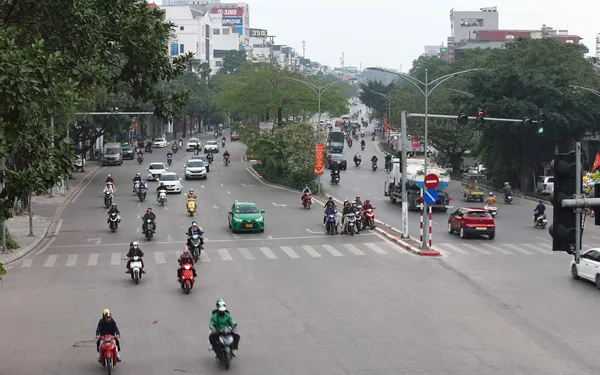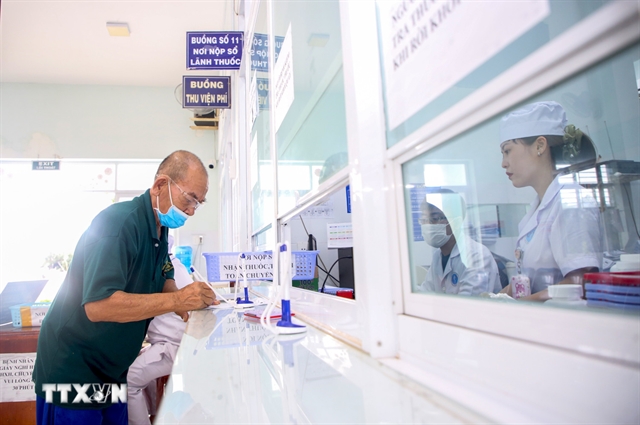 Society
Society

 |
| Part of the Mai Sơn - National Road 45 expressway. VNS/VNA Photo |
HÀ NỘI — Prime Minister Phạm Minh Chính issued an urgent directive on Tuesday to develop standards for expressways and for solutions to ensure the progress and quality of transportation infrastructure investment projects.
The directive was sent to the Ministers of Transport, Construction, Science and Technology, Natural Resources and Environment, Agriculture and Rural Development, as well as the Chairpersons of the People's Committees of provinces and centrally-run cities. It outlined the following:
In recent times, with strong guidance from the Government and the Prime Minister, the Ministry of Transport has actively coordinated with various ministries, sectors, and localities to vigorously implement crucial national transportation infrastructure projects. This effort has yielded some encouraging results, contributing to the country's socioeconomic development and instilling confidence and enthusiasm among the people. Specifically, eight out of 11 component projects of the North-South Expressway East Phase (2017-2020) have been put into operation, increasing the total length of the country's expressways to 1,822km. Furthermore, construction has commenced on 12 component projects of the North-South Expressway East Phase (2021-2025), as well as on the Khánh Hòa - Buôn Ma Thuột, Biên Hòa - Vũng Tàu, Châu Đốc - Cần Thơ - Sóc Trăng expressways, the Ring Road No 3 of Hồ Chí Minh City, and the Ring Road No 4 of the Capital Region. Construction has also started on the passenger terminal at Long Thành International Airport and Terminal 3 of Tân Sơn Nhất International Airport. At the same time, efforts continue to be made to commence and complete several other projects in the near future.
Despite the achieved results, there are still some existing issues related to transportation infrastructure investment, such as some expressways lacking continuous emergency lanes and limited operating speeds, certain expressways having only two lanes, insufficiently logical and scientific arrangements and investments in transportation interchanges, especially the width and connection of expressways to the local transportation network, including industrial zones, urban areas, tourism sites, and services, as well as weak solutions for handling weak ground conditions and inadequate research into using sea sand for key transportation infrastructure projects, which has affected the construction progress of critical transportation projects.
To promptly address these issues, the Prime Minister has instructed the Ministry of Transport to develop and issue expressway design standards urgently. These standards will serve as the basis for planning, designing, investing, constructing, and managing the expressway system and interchanges, as well as for determining investment rates and mobilising appropriate funding for the construction of suitable expressway routes. The process of developing these standards should involve studying international experiences, summarising the practical experience of investing in the construction of expressways in recent times, and ensuring their suitability for Việt Nam's practical conditions. The ministry should also gather opinions from relevant ministries, sectors, localities, experts and scientists.
The standards should address key aspects such as the number of lanes, cross-sections, median dividers, appropriate design speeds, and rest stops. They should also outline principles for the arrangement and organisation of intersections and junctions, ensuring the operation is seamless, convenient, safe, efficient, and compatible with the socioeconomic development requirements of localities and regions. This should maximise the efficiency of investment in expressway routes, creating new development spaces and driving economic and social development in provinces and regions.
The Prime Minister has urgently instructed the review and guidance for localities (as the managing authorities and competent agencies responsible for implementing expressway projects) to review and enhance solutions for handling weak ground conditions in projects, especially those in the Red River Delta and Mekong Delta regions. This is to ensure that the technical requirements and quality of work, especially the settlement time, are suitable for controlling ground subsidence. There should be scientific and reasonable construction solutions that both meet the overall project timeline and address the technical requirements for handling weak ground conditions, without allowing any technical shortcomings or procedures to affect the quality of the works and projects.
Regarding the use of sea sand as foundation material for infrastructure projects, the Ministry of Transport, in coordination with the ministries of Natural Resources and Environment; Construction; Agriculture and Rural Development; and Science and Technology, will expedite the research and use of sea sand for road construction projects, national highways, or even ground preparation for industrial zones and urban areas. This is aimed at reducing reliance on river sand, proactively securing construction materials, and accelerating the construction progress of infrastructure projects in the near future. Additionally, the use of sea sand must adhere to technical standards and not have negative environmental impacts. This should be completed by October 2023.
The Ministry of Natural Resources and Environment will closely collaborate with the Ministry of Transport to thoroughly assess the environmental impact of using sea sand as foundation material for expressway projects. They will calculate, identify, and delineate sea sand areas, provide guidance on survey procedures and extraction, and environmental impact assessments to facilitate timely exploitation for the construction of expressways and other infrastructure projects once research and assessments yield results.
The ministries of Science and Technology, Construction, Natural Resources and Environment, and Agriculture and Rural Development, in line with their functions and tasks, will actively coordinate with the Ministry of Transport in the development and issuance of standards for expressways and the research on sea sand usage for infrastructure projects, ensuring compliance with the specified timeline mentioned above.
The People's Committees of provinces and centrally-run cities, as the governing bodies and authorised agencies responsible for the implementation of expressway projects, will promptly execute the directives of the Prime Minister as per Official Dispatch No 769/CĐ-TTg dated August 26, 2023. They will cooperate with the Ministry of Transport to review the placement of rest stops and junctions connecting expressways to the local and regional transportation networks within their respective areas. This aims to ensure a reasonable and appropriate distance for safe and efficient operation, fostering connectivity and synchrony between expressway routes and local roads to develop new economic spaces and maximise the advantages provided by the expressway routes.
These directives also include overseeing and enhancing solutions for addressing weak soil foundations in projects, following the guidance of the Ministry of Transport at point b, clause 1 of this Dispatch. It is imperative to avoid any technical flaws or procedure-related issues that could affect the quality of the construction works and projects.
The Government Office will regularly monitor and urge the implementation of this Dispatch, with monthly reports to the Prime Minister on the progress of its execution. VNS




